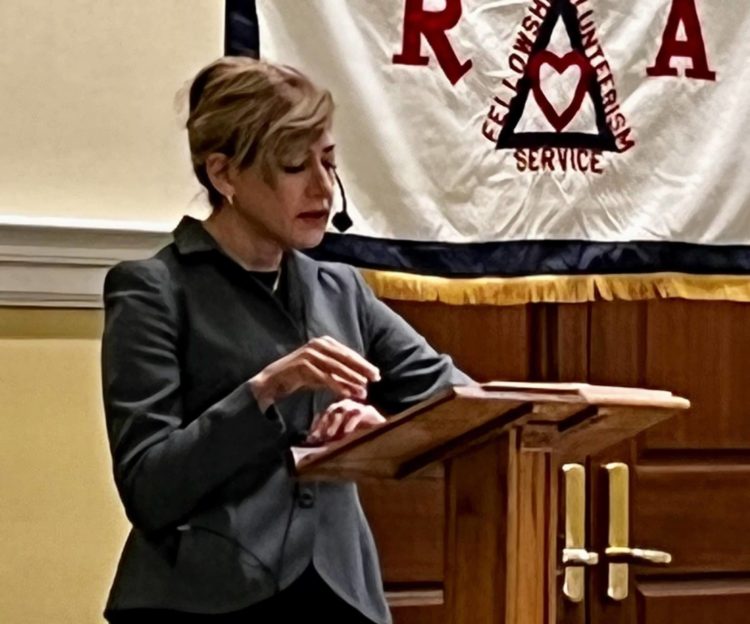
RMA Presents: Democracy in Peril? Ten Critical Political Dynamics to Understand Currently
By Retired Men’s Association of Greenwich
At the September 28 meeting of the Retired Men’s Association, Bob Phillips introduced the speaker, Susan Herbst, Ph.D. Dr. Herbst received her B.A. in Political Science from Duke and her Ph.D. in Communication Theory and Research from the University of Southern California. She served as president of the University of Connecticut from 2010 until 2019, and now teaches at its Stamford campus where she is university professor of political science and president emeritus. She is the author of five books, the most recent being A Troubled Birth: The 1930’s and American Public Opinion. Dr. Herbst discussed her views on these extraordinary political times by exploring seven issues.
First, she noted the polarization of the Washington elite. Government had long operated in a bipartisan manner, with some Republicans supporting Democratic initiatives and vice versa. That changed, she said, with the strategy championed by Newt Gingrich in the 1990s when he introduced his Contract with America that led to the Republicans winning back the House. Although this rejection of any semblance of bipartisanship began with Gingrich, it has since been embraced by both parties. The result has been the least productive congresses since the Civil War.
Second, she asserted that the polarization has spread to the general populace. Until about 2015, Republican and Democratic voters often agreed on specific issues, with voters generally being “down-the-middle” in terms of political views. Since then, however, there has been what political scientists refer to as “sorting.” Voters affiliate themselves with one party, and then they embrace all of the views advocated by that party. While sorting isn’t absolute – e.g., voters in certain geographical areas differ from those in their party elsewhere – there is far less issue-by-issue deviation from party norms than was traditionally the case.
Third, there is less stability in U.S. government than there has been since the Civil War. While in the 1930s heated disputes regarding the Depression and immigration were amplified by the growing role of radio, the situation today is more perilous (for one thing, we live in a world with nuclear weapons) and more susceptible to untoward influences (Twitter enabling anyone to get an audience).
Fourth, Dr. Herbst reflected on the schadenfreude that has infected U.S. political discourse. Many people now seem more interested in seeing the opposing political party lose – indeed, suffer – than in seeing their own prevail. She drew an analogy to the Duke-UNC basketball rivalry.
Fifth, she reflected on the impact of social media. More people have become involved in politics, but not in the way that we want. Voting has not increased significantly, but espousing unsupported claims and conspiracy theories has.
Sixth, Dr. Herbst noted that, at least as compared to recent decades, she believes that voters are more likely to have racial issues dictate their vote. While race has long affected voting, it had been secondary to economic issues, but that has seemed to reverse as more Americans are concerned that America is being lost to “the other.”
Seventh, Dr. Herbst emphasized that the old adage that “elections matter” is truer now than ever. Sadly, many potential voters appear not to have grasped that fact. Young people have very low voting turnout, and that disserves them and society as a whole. Using what she called a “political science technical term,” she opined that we were “toast” if they don’t vote. An important element of any solution to this problem would appear to be enhanced K-12 education.
Dr. Herbst then took questions from RMA members. In response to a comment that the two people she had singled out for creating polarization were Republicans – Gingrich and Donald Trump – she agreed that both parties are responsible for it but said that Gingrich merited special note because he had pioneered the approach that both parties came to adopt. With respect to wokeness/cancel culture, she said that they were very damaging, but that fortunately they seemed to be ebbing somewhat. As for what K-12 education could do better, she suggested that a high priority should be teaching students how to weed through social media posts, analyzing sources and the basis for the claims. She analogized this to how we all learned to dismiss silly advertising claims. She acknowledged the problem that K-12 education was a “prisoner of zip codes” given its local funding, but she noted that George W. Bush’s No Child Left Behind policy had been somewhat successful on a national level. Finally, she thought ranked choice voting was an interesting possibility which has been shown to reduce extremism of candidates by rewarding those who play to the middle.
To see the full presentation, go to https://greenwichrma.org/, cursor to “Speakers” and click on “Speaker Videos.”
Note: The views expressed in this presentation are those of the speaker, and do not represent the views of the RMA.
The RMA’s upcoming presentation, “The President’s Man: The Memoirs of Nixon’s Trusted Aide” by Dwight Chapin is scheduled for 11 AM on Wednesday, October 12. From Richard Nixon’s, “You won’t have Nixon to kick around anymore,” in his 1962 California gubernatorial campaign through his world-changing trips to China and Russia and epic downfall, Dwight Chapin was at his side. He was with him in his most private and public moments.
Chapin served as Nixon’s personal aide and then as Deputy Assistant in the White House. He travelled with him, advised, strategized, campaigned, and learned from America’s most controversial President.
Chapin’s story includes working with Henry Kissinger during his secret trip to China, working for Bob Haldeman, and meetings with Chou En-lai, Pat Nixon, Spiro Agnew, J. Edgar Hoover, Frank Sinatra, Roger Ailes, Coretta Scott King, Elvis Presley and others.
Henry Kissinger notes, “The Presidents’ Man,” is an engaging, provocative look at the Nixon presidency written by someone with unique experience in the Nixon White House.”
Dwight created Chapin Enterprises where he consulted and did public speaking.
He is a member of the Greenwich Retired Men’s Association. He and his wife Terry reside in Greenwich. They have five children and 15 grandchildren.
Please note: Attendees must show proof of vaccination and booster at the door for admittance.
To stream Mr. Chapin’s presentation at 11 AM on Wednesday, October 12, click here (https://bit.ly/30IBj21). This presentation will also be available on local public access TV Channels, Verizon FIOS channel 24 and Optimum (Cablevision) channel 79.
RMA speaker presentations are presented as a community service at no cost to in-person or Zoom attendees. The RMA urges all eligible individuals to consider becoming a member of our great organization, and thereby enjoy all the available fellowship, volunteer, and community service opportunities which the RMA offers to its members. For further information, go to www.greenwichrma.org, or contact our membership chairman (mailto:members@greenwichrma.org).



